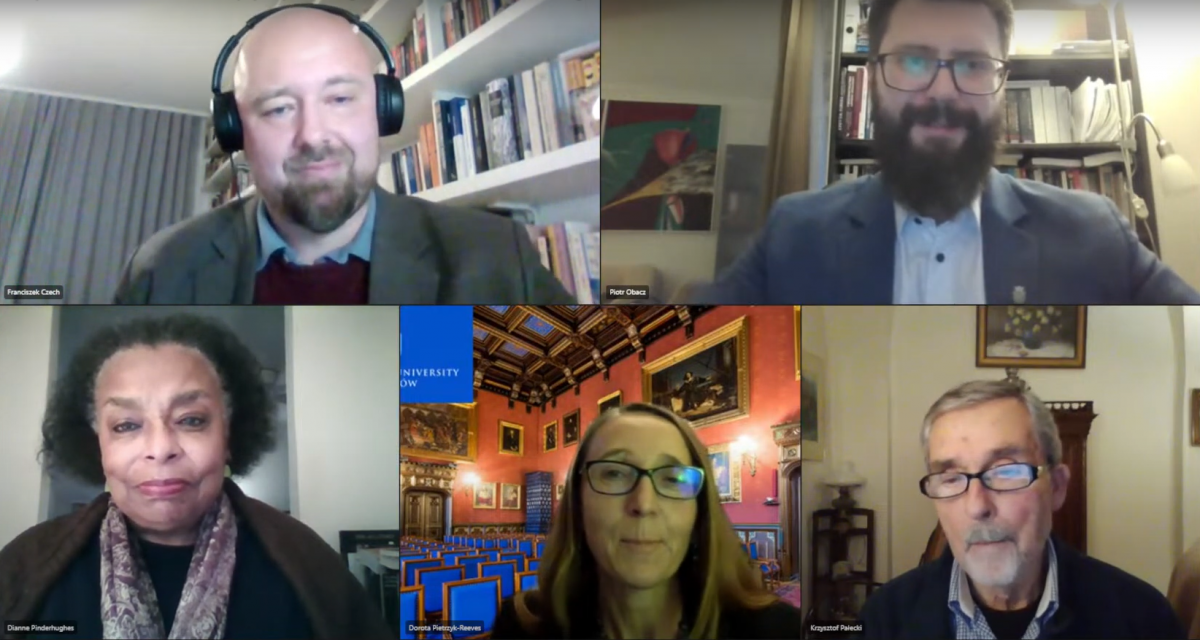

IPSA President Delivers a Lecture on the Future of Political Science
Publication date: Mon, 28 Nov 2022
IPSA President Dianne Pinderhughes was the guest speaker at the Polimpact - Social Relevance and Impact of Political Science Project’s online lecture series on Monday, 21 November 2022. Prof. Pinderhughes delivered an online lecture entitled Is There a Future for Political Science? Reflecting on How to Turn it Inside Out, Upside Down, and/or Maybe into an Exciting Field.
The virtual event began with the introduction of Prof. Piotr Obacz, Chair of the History of Polish Political Thought at the Jagiellonian University in Kraków, who explained the Polimpact Project and its objectives. Prof. Dorota Pietrzyk-Reeves, Vice-Dean of the Faculty of International and Political Studies at the Jagiellonian University, then introduced Prof. Pinderhughes and discussed her background and research interests. Next was Prof. Franciszek Czech, Chair of the Kraków Branch of the Polish Political Science Association, who welcomed participants on behalf of the Polish Political Science Association and talked about the Association’s new online academic events.
The presentation of Prof. Pinderhughes focused on the changes and transformations of the political science field in the last few decades. She first discussed the major changes that occurred at the American Political Science Association (APSA) and IPSA starting from the 1980s, such as the Organized Sections, which officially became a formal component of APSA during those years and which rapidly expanded under the Presidency of Theodore J. Lowi in the early 1990s. IPSA has also undergone significant changes more recently and adopted administrative reforms to be an efficient organization. For instance, the Association shifted from a post-WWII structure featuring Secretary-Generals to an Executive Director model and added the positions of President-Elect and Past President to the leadership structure.
In her lecture, Prof. Pinderhughes pointed out the growing recognition of race within the American political science environment and how racial politics has been recognized in recent years. Several events prompted this recognition, including the elections of Barack Obama and Donald Trump, and the murder of George Floyd.
Drawing on her own experience when she was teaching at the University of Illinois Urbana-Champaign, Prof. Pinderhughes reflected on the role of student organizations in reducing the hierarchy in educational interactions. She gave the example of a group of engaged students who participated in meetings of the National Council of Black Political Scientists and attended various conferences. These students then had very successful careers and moved rapidly into leadership positions.
Prof. Pinderhughes also emphasized the impact of digitalization, which created a massive amount of new forms of data, adding that the new generation of political scientists, especially, make use of these changes to transform the discipline.
She finally highlighted the complexity of political science and concluded that political science has a future: “One that will survive as long as we are creative and willing to change.”
The lecture was followed by a Q&A session.
The Polimpact Project
The Polimpact Project was implemented by the scholars of Jagiellonian University in Kraków, the Polish Political Science Association (Kraków Branch) and the Youth Center in Kraków to organize popular-scientific and scientific meetings aimed at enhancing and developing political science. The objective is to raise awareness of the significance, social role, and impact of political science within the systems of science, state and society, and to promote this scientific discipline through popular scientific activities.
You can watch the full event video below:











